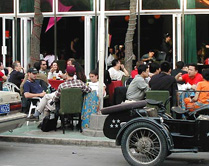 SARS may have been a recipe for disaster for restaurants in major Chinese cities but they are cooking up plans to meet demand as customers return to the dinner table.
SARS may have been a recipe for disaster for restaurants in major Chinese cities but they are cooking up plans to meet demand as customers return to the dinner table.
Yiyuan Restaurant on the famous Guijie Street near the Dongzhimen Overpass in Beijing reported that many of its 110-odd tables were occupied by 6 pm Monday. The street is famous for dozens of restaurants providing food around the clock.
A waitress said that all tables would be taken by 9 pm. "We have been busy since the middle of last month," she said.
It is a similar situation at many other restaurants on the street - although some establishments remain shut.
"For smaller restaurants with insufficient funds, the temporary closure might become perpetual," Gong Li, deputy director of the Beijing Municipal Commercial Commission.
"High rental fees and utility charges for the past two months may prove crushing to many of them."
A report by the Beijing Municipal Statistics Bureau said the turnover of the Beijing restaurant industry fell by 4 percent in April on the same period last year. It is the first time that the industry has suffered a decrease in turnover on a year-on-year basis since 2000.
But official indices revealed the turnover of the city's 12 largest restaurant chains rebounded by 20 percent last weekend, with 10 percent more customers.
The confidence of local people is essential to the recovery of the city's restaurant industry, Gong said.
Apart from a reduction in related taxes and administrative fees, the commission introduced a policy last Friday to support outdoor dining.
Outdoor dining is now permitted in central Beijing from May 27 to October 15.
The new policy means all interested applicants can get approval "if they are financially qualified and can satisfy related hygiene standards."
Restaurant industries in Shanghai and Guangzhou, capital of South China's Guangdong Province, have also received strong government support.
The Shanghai municipal government has announced a package of preferential polices, including cutting some administrative fees and taxes, providing financial support, and giving bonuses to encourage more favorable services.
The restaurant business in the city normally has an annual increase of about 10 percent but has been sluggish since April. Sales in the past 20 days of April were only 20 percent of the same period last year. Most of the 30,000 restaurants in the city only netted between 10 and 20 percent of their expected income while some closed temporarily.
But the market has gradually rebounded since mid-May, according to sources with the Shanghai Municipal Commercial Commission.
Sales of the industry in Shanghai bounced to 30 to 35 percent.
(China Daily June 3, 2003)
|

